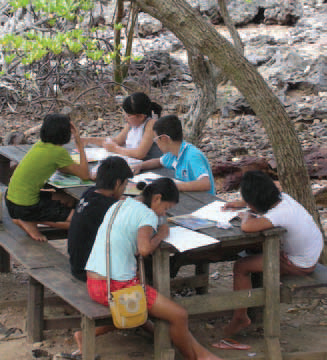Disclosure and Consent Among Adolescents with HIV
July 2010 - The number of children under 15 living with HIV was estimated at 2.1 million worldwide in 2008.1 As these children are becoming adolescents, issues of disclosing their HIV status to them and gaining consent for their participation in HIV care and research are increasingly important to providers, caregivers, and the adolescents themselves. Despite the impact of these issues, however, there is no standard practice within Asia for how and when to approach disclosure and consent.

A camp in Thailand for youth with HIV. |
The struggle to find appropriate approaches to disclosure and informed consent is growing as the pediatric epidemic in the region matures. A recent study exploring consent in resource-limited countries found that lack of autonomy, illiteracy, poverty, and socio-cultural and religious diversity complicate consent and disclosure practices.2 Investigators emphasized the importance of involving families and communities in making decisions about participation in research. Particularly challenging is the need to protect the privacy rights of adolescents when obtaining consent from parents or guardians.
It is important for adolescents and their legal guardians to fully comprehend the research and understand who will have access to what information. Towards this end, the processes of disclosure and obtaining informed consent should be conducted in local languages, prepared and delivered in a manner that is culturally appropriate and reflects the sex and developmental age of the adolescent, and involves counselors with experience in information disclosure and methods of communication. The need to view the process of disclosure as a continuous rather than a discrete event was emphasized, as was the importance of providing ongoing access to family counseling.
Disclosure and consent are critical issues for adolescents. As the need for HIV research involving adolescents increases, age-appropriate and culturally sensitive models are needed to more effectively support care providers in this complex proces
1. UNAIDS. Global Facts and Figures 2009. data.unaids.org/ pub/FactSheet/2009/20091124_FS_global.en.pdf
2. Mystakidou K, et al. Ethical and practical challenges in implementing informed consent in HIV/AIDS clinical trials in developing or resource-limited countries. SAHARA J. 2009 Sep; 6(2):46-57.